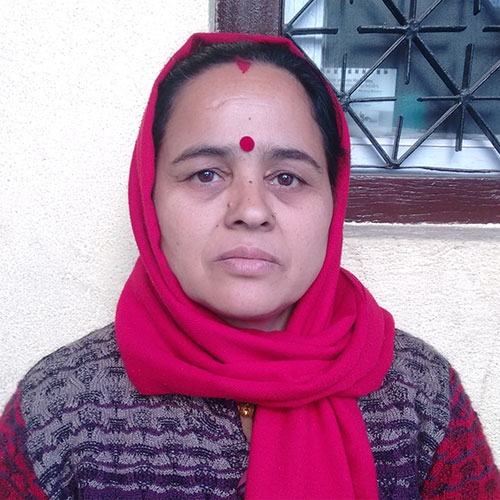Left-wing activist disappeared in 2002
FACTS

Surya Prasad Sharma was a long-term left-wing activist and supporter of the Communist Party of Nepal (Maoist) (CPN-M). He was never involved in armed activities, but after being arrested and tortured by police in 1997 for his association with the CPN-M he went into hiding for five years. He returned home, unwell, in January 2002. The day following his return he was arrested athis house by Royal Nepal Army soldiers and taken to an Army Barracks. His wife received reports that he was beaten severely over the next ten days, and he has never been seen again.
Read more: here
Procedure
After Surya Prasad Sharma’s disappearance his wife, Yashoda Sharma, visited the barracks on a number of occasions seeking further information. She also filed a complaint with the National Human Rights Commission of Nepal. In February 2003, she filed a case to the courts seeking his release. All government authorities denied his arrest and detention, except the Baglung Chief District Officer. He told the court that Mr Sharma had tried to escape by jumping into a river, and had drowned. A government committee set up to investigate disappearances provided the same information. On the basis of this information the court closed the case.
Yasoda Sharma took Surya Prasad’s case to the UN Human Rights Committee in April 2006, represented by Advocacy Forum Nepal. In October 2008, in its first ever case on Nepal, the Human Rights Committee handed down its decision.
It found that Mr Sharma had been forcibly disappeared, and that this resulted in violations of his right to be free from torture, right to humane conditions of detention, and right to liberty. It also found that the anguish and stress caused to Mrs Sharma amounted to a serious violation of her human rights.
“Though the possibility of people like us getting justice in this country is very difficult, I cannot betray my husband. I have tried everything possible to get the truth about my husband, I have moved to the international level too. Despite all the difficulties that I have to go through I will continue to search for the truth and to get justice.” Yashoda Sharma, wife of Surya Prasad Sharma.
Read the decision: English Nepali
See further: Advocacy Forum (2012), Yasoda Sharma: A wife’s fight for justice
RECOMMENDATIONS
The Human Rights Committee said that Nepal should carry out a thorough and diligent investigation, provide information resulting from the investigation to Surya Prasad Sharma’s family, and prosecute, try and punish those responsible. Nepal should release Surya Prasad Sharma immediately if he is still alive, provide adequate compensation to Yasoda Sharma and her family, and take measures to prevent similar violations in the future.
| Investigation of the facts and information to the family | |
| No effective investigation has been carried out. | |
| Prosecution and punishment of perpetrators | |
| No person has been prosecuted in relation to the crime. | |
| Reparation | |
| Yasoda Sharma has only been provided with a small amount of additional “interim relief” by the Government above that paid to all victims of disappearance during the conflict, which is not commensurate with the gravity of the violation or losses suffered. | |
| Prevention of similar violations | |
| Albeit the new Criminal Code (entered into force in 2018) codifies the autonomous offences of torture and enforced disappearance, the definitions of the crimes enshrined therein and the corresponding regulation – concerning, for instance, statutes of limitation and compensation – remains at odds with international law. | |
| Translation & dissemination | |
| The Views of the Human Rights Committee on this communication have been translated into Nepali but not disseminated widely. |
Note these are unofficial gradings as the Human Rights Committee has not yet commented on implementation.
EFFORTS FOR IMPLEMENTATION
- Shadow Report to UN Human Rights Committee on Implementation, February 2014 (English)
- Meeting between Mrs Sharma’s representatives and the Government to discuss his case
- Letters to the Human Rights Committee June 2009, March 2010, June 2010, November 2010, October 2011, July 2012, March 2013, November 2013, July 2014
- Meetings with the Human Rights Committee July 2012 and November 2015
